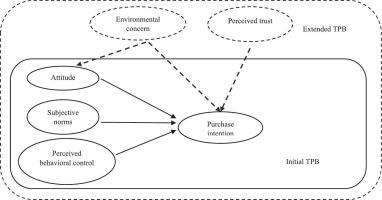Purchasing certified forest products to participate in sustainable forest management: Unveiling the drivers of consumers' intention
IF 3.8
2区 农林科学
Q1 ECONOMICS
引用次数: 0
Abstract
Purchasing certificated forest products is an approach to the public participating in sustainable forest management. There is a research gap about deriving factors that promote purchasing these products. This study investigates the psychological factors influence citizens' intentions to purchase certified forest products utilizing an extended Theory of Planned Behavior (TPB) model incorporating two additional constructs including environmental concern and perceived trust in certification mechanisms in Tehran, Iran, with a sample size of 447 consumers of furniture and wood product markets. Data collection was carried out through structured questionnaires. The hypotheses of study and relationships between variables were tested using structural equation modeling. The initial TPB model explained 65 % of the variance in purchase intention, while the extended model increased this explanatory power to 73 %. The findings revealed that attitude, perceived behavioral control, environmental concern, and perceived trust significantly influenced purchase intention. The study underscores the importance of fostering positive attitudes toward certified forest products through educational and promotional programs, enhancing environmental concern, and building trust in certification systems. These efforts can strengthen consumers' intentions to purchase certified products, thereby supporting sustainable forest management practices. This study contributes to the exiting knowledge by validating the extended TPB model in the context of environmentally sustainable purchasing intention and highlights the critical role of trust and environmental concern in shaping consumer intention. The findings of the research include actionable insights for policymakers and practitioners aiming to promote sustainable consumption and enhance public participation in environmental conservation efforts.

购买经认证的林产品参与森林可持续经营:揭示消费者意愿的驱动因素
购买认证林产品是公众参与森林可持续经营的一种途径。对于促使人们购买这些产品的因素的推导存在研究空白。本研究利用扩展的计划行为理论(TPB)模型,结合环境关注和对认证机制的感知信任两个额外结构,在伊朗德黑兰调查了影响公民购买认证林产品意愿的心理因素,样本量为447名家具和木制品市场消费者。数据收集通过结构化问卷进行。采用结构方程模型对研究假设和变量之间的关系进行检验。最初的TPB模型解释了65%的购买意愿方差,而扩展模型将这一解释力提高到73%。调查结果显示,态度、感知行为控制、环境关注和感知信任对购买意愿有显著影响。该研究强调了通过教育和推广计划培养对认证林产品的积极态度、加强对环境的关注以及建立对认证体系的信任的重要性。这些努力可以增强消费者购买经认证产品的意愿,从而支持可持续森林管理做法。本研究通过验证环境可持续购买意愿背景下的扩展TPB模型,为现有知识做出贡献,并强调信任和环境关注在塑造消费者意愿中的关键作用。研究结果为政策制定者和实践者提供了可行的见解,旨在促进可持续消费和加强公众对环境保护工作的参与。
本文章由计算机程序翻译,如有差异,请以英文原文为准。
求助全文
约1分钟内获得全文
求助全文
来源期刊

Forest Policy and Economics
农林科学-林学
CiteScore
9.00
自引率
7.50%
发文量
148
审稿时长
21.9 weeks
期刊介绍:
Forest Policy and Economics is a leading scientific journal that publishes peer-reviewed policy and economics research relating to forests, forested landscapes, forest-related industries, and other forest-relevant land uses. It also welcomes contributions from other social sciences and humanities perspectives that make clear theoretical, conceptual and methodological contributions to the existing state-of-the-art literature on forests and related land use systems. These disciplines include, but are not limited to, sociology, anthropology, human geography, history, jurisprudence, planning, development studies, and psychology research on forests. Forest Policy and Economics is global in scope and publishes multiple article types of high scientific standard. Acceptance for publication is subject to a double-blind peer-review process.
 求助内容:
求助内容: 应助结果提醒方式:
应助结果提醒方式:


